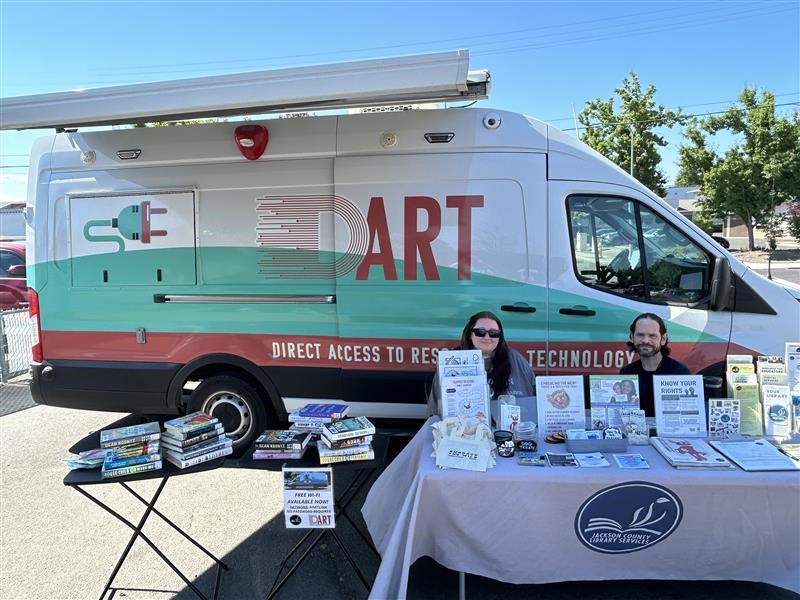Once upon a time, going to a Jackson County Library Services branch was the only option if patrons wanted to access technology offerings such as computers, high speed WiFi, and printing.
But that hasn’t been the case at JCLS since 2021. And it’s all thanks to a vehicle that has the same aesthetic as the Batmobile (minus the atomic batteries, engine turbines, grappling hook, and a dozen other crime fighting accoutrements.)
No, the DART (Direct Access to Resources & Technology) van doesn’t fight crime, but it does fight barriers to information access; smashes right through them like the Kool Aid Man caving in your kitchen wall.
Oh yeahhhhhh.
Offerings
“Our mission aligns with the mission of the library: to bring ideas (and) information to people,” says JCLS technology education specialist Maddy Tuttle. “I like to think of the DART van as a mini library branch; we have pretty much everything that you can find at a branch.”
That Branchmobile (look, whatever, I’ll work on it) comes with WiFi that has a signal radius of 300 feet (about 91 meters if you’re reading this outside the U.S.), 10 laptop computers for patron use, and a printer. Patrons can also sign up for library cards and check out books from the JCLS overflow collection.
And if that’s not enough, staff also promote programs and hand out swag and information about community resources.
Oh, and some free kibble if your canine pal has a snack attack. DART is very pro-dog.
“All the things a branch has got, but just all in a van,” Maddy says.
Maddy’s been at the wheel since March 2024, just a few months after starting at JCLS in August 2023 as a clerk. Prior to that, she worked at the Florida Holocaust Museum.
“Museums and libraries kind of have a similar mission of bringing education and information to people and connecting people to each other, and to that information,” Maddy says. “So I thought, ‘They go so hand in hand.’ I applied and got a position, and I really love doing the outreach, and going out to people, and literally meeting people where they’re at.”
She elaborates and says mobility issues and other complications can preclude people from making it to a traditional branch.
“There are different barriers for different locations that we go to,” Maddy says.
Regular stops
On a warm July morning, Maddy and technology education specialist Ryan Murphy sit in the DART van’s shade while at Rogue Retreat’s Kelly Shelter in Medford, a 115-bed shelter for the unhoused. It’s one of DART’s regular stops.

Other current routine visits include the Oregon Department of Human Services’ Self Sufficiency Office, Rogue Retreat’s Crossings, Opportunities for Housing, Resources, and Assistance in Ashland, and the Applegate Evening Market.
“We also kind of sporadically partner with ACCESS food pantries. They have a mobile unit, too, so that’s been really great,” Maddy says. “I’ve found that when DART is partnering with another organization, we’re a lot more successful.”
You can also catch DART at larger community events, such as Medford’s recent Juneteenth celebration and the Independence Day parade in Eagle Point.
“This one is definitely a more popular site,” Maddy says of the Kelly Shelter, where about a dozen people have gathered nearby. Most of them socialize and try to keep to the shade as the early July day heats up. “All the people know us pretty well. We’ve been coming to the Kelly Shelter, specifically, for years.”
This schedule can change, however, constantly evolving based on where needs arise.
“We’re very flexible, very fluid,” Maddy says. “We do try different things to see what works best.”
Removing barriers during the journey
Watching patrons make positive progress in their individual journeys and life goals is a rewarding part of the job, Maddy says, especially when it comes to housing.
“It’s always really nice when we go to these Rogue Retreat sites and different transitional housing places where we have a patron that we see week after week and month after month, and then they finally get into housing,” Maddy says. “That is one of the best interactions that I have with patrons, because they come up us and very excitedly share their story.”
Maddy, in return, is always excited to tell such patrons about their new local branch.
Other standout interactions included a situation where Maddy helped clear longstanding overdue fines — JCLS did away with overdue materials fines in 2018 — off a patron’s account after discovering them loitering there.
“We got him a fresh start,” Maddy says. “(Now) he uses our library services all the time.”
Helping other patrons learn how to access free digital services such as Hoopla and Libby is also rewarding.
“That lightbulb moment is fantastic,” Maddy says. “All of our catalog, honestly. People are so shocked to hear about Library of Things. People are delighted to know that their favorite author has 10 books in our collection, whether that’s physical copies or on Libby.”
DART’s initiatives in the works include adding tablets to the van’s technological treasure chest, a way to bridge the gap between laptops and phones when it comes to ease of use.
“We’re hoping to add that soon,” Maddy says.
The goal of removing barriers has been with DART since its inception. The original June 2021 press release said DART would have a focus “on those most affected by COVID-19 and the Almeda and Obenchain wildfires. This includes residents who have lost their jobs or homes, children and adults who have difficulty accessing the Internet, and unhoused residents.”
Much of that focus has obviously shifted since then, but the overall mission remains the same: key library services, venturing out to patrons who need them.
